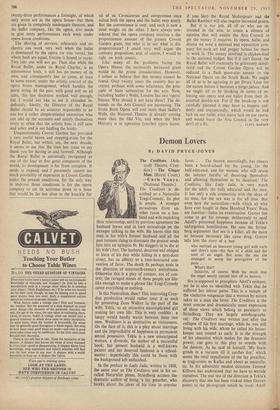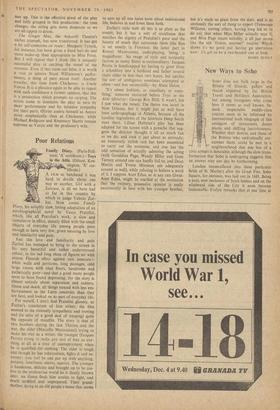Demon Lovers
By DAVID PRYCE-JONES
The Creditors. (Ash-
croft Theatre, Croy- don.) — The Ginger Man. (Royal Court.) —Uncle Vanya.
(National Theatre.) The Creditors is de- scribed as a Naturalist Tragi-Comedy: Its plot is simple. A stranger eavesdrops from an- other room on a hus- band and wife unpicking their relationship, until by previous agreement the husband leaves and in turn eavesdrops on the stranger talking to the wife. He learns that this man is his wife's former husband and all the past torment rising to dominate the present sends him into an epileptic fit. He staggers in to die at his wife's feet. The husband, deceived and obliged to learn of his fate while hiding in a next-door closet, has an affinity to a time-honoured con- vention of farce. The death fit perhaps nods in the direction of mineteenth-century melodrama. Otherwise this is a play of content, not of con- text; the ravaged minds of these people are life- like enough to make a phrase like Tragi-Comedy cover everything or nothing.
Is this Naturalism, then? This interesting Croy- don production Would rather treat it as such by presenting Zena Walker in the -part of the wife, Tekla, as an attractive uncomplicated girl making her own life. This is very credible: a harpy would hardly waver between these two men. Weakness is as destiuctive as viciousness. On the face of it, this is a play about marriage and the impossibility of happiness in permanent sexual possession. Tekla is a new emancipated woman, a divorcée, the author of a successful book; her present husband is a well-known painter and her deserted husband is a school- master : superficially this could be Ibsen with the background left unfinished.
In the preface to Lady Julie, written in 1888, the same year as The Creditors, and in his so- called Naturalist phase, Strindberg accuses the dramatic author of being' 'a lay preacher, who hawks about the ideas of his time in popular
form. . . . The theatre, accordingly, has always been a board-school for the young, for the half-educated, and for women, who still retain the inferior faculty of deceiving themselves
and allowing themselves to be deceived.' The Creditors, like Lady Julie, is very much
for the adult, the fully educated and the men.
It has only a side connection with the ideas of its time, for the sex war is for all time. But even here the naturalism—with which all who
have ever fought in these Hundred Years'. Wars are familiar—fades on examination. Gustav has
come to get his revenge, deliberately to spoil Adolf's presumed happiness because of Tekla's unforgotten humiliations. He uses the Strind- berg arguments that sex is a killer, all the more so because necessary like some drug. Gustav tells him the story of a boy who married an innocent young girl with curls and dove's eyes—the face of a child and the soul of an angel. But none the less she managed to usurp the prerogative of the male . . .
What's that?
Initiative, of course. With the result that the angel nearly carried him off to heaven.
Sex is supposed to precipitate Adolf's epilepsy, yet he is also so identified with Tekla that he
suffered her labour pains. This is a sample of
the vindictive vengeance that a woman by nature takes on a man she loves. The Creditors is the
most concise and dramatically exact expression of these views which belong so peculiarly to Strindberg. They are largely autobiographi-
cal: The Creditors was written just after the
collapse of his first marriage, while he was still living with his wife, whom he called his house- keeper and treated as such. It is the strength of his obsession which makes for the dramatic power; one goes to this play to wrestle with
the demon. As he said of himself, 'My brain grinds in a vacuum till it catches fire,' which seems the total repudiation of the lay preacher, as tragi-comic as Kafka and about as naturalis- tic. In his admirably modest direction Terenc6 Kilburn has understood that we have to wrestle ourselves. The real test of the direction is Tekla's discovery that she has been tricked when Gustav points to the photograph which he made Adolf tear up. This is the effective pivot of the play and fully grasped in this production: the tone changes, the acting gets more desperate as we are all tipped to doom.
The Ginger Man, the Ashcroft Theatre's earlier triumph, has now transferred. It has got a bit self-conscious en route: Margaret Tyzack, for instance, has been given a fixed hair-do and more make-up than appropriate to Miss Frost. But I will repeat that 1 think this a uniquely successful play in catching the mood of the moment. Even if 'this turns out false, it is worth a visit to admire Nicol Williamson's perfor- mance, a thing of pure mood itself. Another transfer, this time from Chichester, is Uncle Vanya. it is a pleasure again to be able to repeat with such confidence a former opinion, that this is a production which prompts no carping. The actors come to dominate the play in turn by sheer performance and by intuitive sympathy for their parts. Olivier asserts himself as Astrov more emphatically than at Chichester, while Michael Redgrave and Rosemary Harris remain supreme as Vanya and the professor's wife.































































 Previous page
Previous page